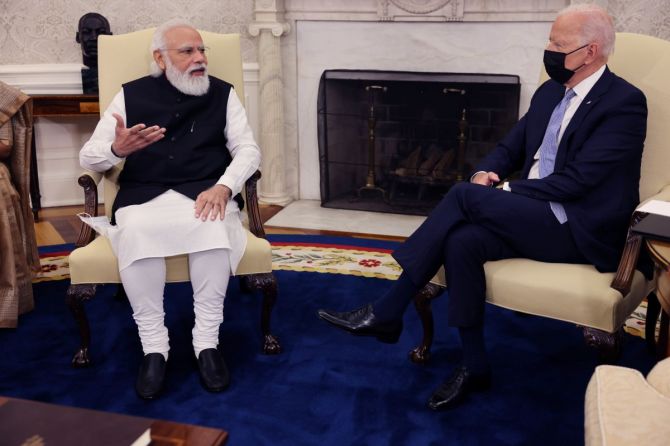'There are three pillars of concern: The expansion of Hindu majoritarianism, the concentration of executive power and decay of independent institutions, and curbs on free expression and dissent.'

"The United States has lost a lot of moral authority after the last administration and the events of January 6th. India too has its fair share of democratic challenges at home. That means that the 'values' pillar of the relationship is on shakier ground," Milan Vaishnav, tells Rediff.com's Archana Masih in the concluding segment of a two-part interview.
Dr Vaishnav is Senior Fellow and Director, South Asia Programme at the Carnegie Endowment for International Peace in Washington, DC.
His primary research focus is the political economy of India. He examines issues such as corruption and governance, State capacity, distributive politics, and electoral behaviour. He conducts a regular podcast on Indian politics, Grand Tamasha.
Though Mr Modi has met Mr Biden before as VP, how do you think their first face to face meetings went -- and with Vice President Kamala Harris? Any points that stood out for you about these personal interactions? The optics/body language etc?
I think the meeting with Harris was quite symbolically important in that an Indian prime minister was meeting with the first Indian-origin vice president in American history.
I think both sides seem to understand and play up that history. As you know, Modi has made outreach to the Indian Diaspora a key component of his foreign policy.
In her public remarks, Harris also addressed the sensitive issue of democracy, pointing to the fact that both India and the United States have considerable work to do there.
As far as the Biden-Modi summit is concerned, my understanding is that the meeting was not only cordial, it was also quite extensive in terms of the topics covered.
Biden has been a long backer of the US-India strategic partnership and this White House sees India as absolutely central in its Indo-Pacific strategy.
They are not blind to the challenges -- whether on politics, trade or technology -- but they also see an opportunity, given recent Chinese actions, to really press forward on diplomatic and military cooperation.

How different was this visit compared to Mr Modi's previous visits to America under Presidents Trump and Obama?
I think this visit is coming at a different time. The United States has lost a lot of moral authority after the last administration and the events of January 6th.
India too has its fair share of democratic challenges at home. That means that the 'values' pillar of the relationship is on shakier ground.
However, the pressure to work together is even greater than before, because the Chinese have launched a full-court press on the border, in the region, and globally to advance their geopolitical agenda.
The confluence of the two raises some uncomfortable questions in Washington, where there is a vocal minority pressuring the Biden administration to be more forward-leaning on democracy and human rights.
Mr Modi said it was a 'landmark meeting' between him and Mr Biden? Do you agree?
Again, I don't see the bilateral meeting as landmark per se, but I do feel that appellation could apply to the Quad meeting.
Some observers have downplayed the Quad summit as light on deliverables. I confess I had the opposite reaction: The sheer diversity of initiatives was striking -- from climate to vaccines and STEM research and education.
Now, as they say, the 'proof of the pudding is in the eating' -- there's a lot of work the four countries have to do to really deliver.
That's easier said than done. For instance, we've seen how the Delta variant upset the Quad's plans on vaccine cooperation.
Mr Biden and Ms Harris spoke about respecting democratic values -- especially the US VP who spoke about defending democratic institutions. Does the Biden administration feel India is lurching away from its commitment to democracy?
As I've said before, there is growing concern here about democracy in India. Not in the broad outlines of electoral democracy, but in the government's liberal commitments in between elections.
There are three pillars of concern: The expansion of Hindu majoritarianism, the concentration of executive power and decay of independent institutions, and curbs on free expression and dissent.
Indians, of course, may well have concerns about democracy in the United States -- and they would be right to, in my view.
In my lifetime, I've never seen so many legitimate questions being asked about the sanctity of our own (US) democracy.
We came close to a major constitutional crisis in January of this year. This could easily happen again.
Feature Presentation: Aslam Hunani/Rediff.com










